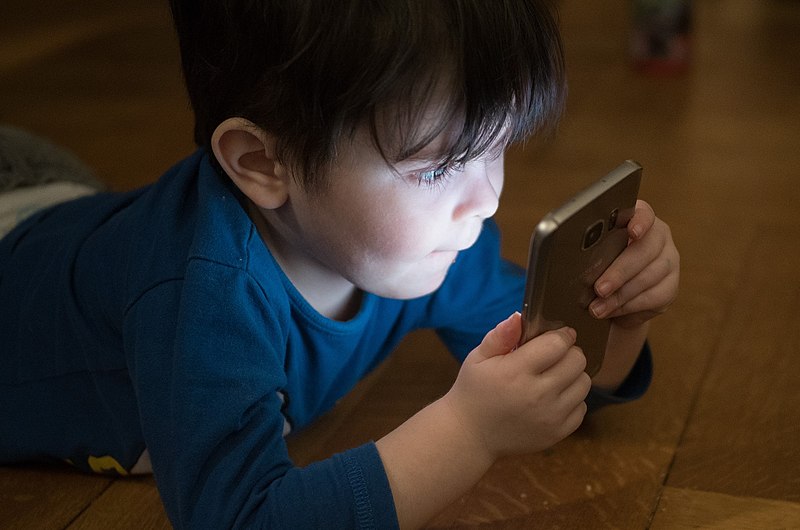Recently, we’ve been hearing a great deal about how some parents — usually wealthier, more educated ones — ban their kids from looking at screens. In October, the New York Times ran a series of stories about how tech executes in Silicon Valley obsessively keep their kids far away from the devices they invent. They send their kids to screen-free schools. They make their nannies sign contracts promising not to use a smart phone while on duty.
Whether you agree or disagree with that approach, one thing is undeniable: there are parents who object vehemently to screens around their kids.
Yet most of humanity acts like such parents don’t exist. There’s a few enclaves of screen-free parenting, like Silicon Valley. But everywhere else in the world, people act like screens and kids belong together.
I can’t tell you how many times adults interact with one of my kids and then casually pull out a phone to show them a video. When we go to other people’s houses, they frequently flick on their TV for my children. Last year we were staying in a hotel and a maintenance guy came by to fix something. When he saw my children, he picked up the remote and put cartoons on the TV — as if that was the most natural thing in the world.
I am not a Silicon Valley executive, but I am raising my kids screen-free. There’s extensive data showing screens are bad for kid’s development, particularly in their first two years. In addition, there’s so much inappropriate content to be found on devices. Most parents today have had a bad experience with YouTube auto-play showing their kids something they should not have seen.
There are also plenty of parents who don’t ban screens altogether, but who do impose strict limits on their kids’ screen time.
It is striking to me that people never fail to ask my permission before they feed my kids anything. It’s always: “Can I give your son a chocolate?” or “Is your daughter allowed to have candy?”
By contrast, I have never yet — not a single time — had anyone ask me for permission to show my kids a screen.
That’s bizarre because I am far more concerned about what goes into my kids’ minds than what goes into their tummies. A piece of chocolate moves through the digestive system pretty quickly. Mental pollution from something they see on a screen can last a lifetime.
I am still figuring out the best way to handle situations where people show screens to my kids. The adult in question is usually just trying to be nice, so it’s hard for me to tell them to put their phone away. But I’ve realized that is exactly what I need to do.
I have started saying, “Oh, my kids aren’t allowed to look at screens.” Yes, it’s awkward, but accompanied with a friendly smile, this simple request takes care of the matter. And it sends a message. Screen-free and low-tech parents do exist, and their beliefs deserve respect.
Perhaps you would consider joining me.
If you don’t have kids of your own, asking the parent’s permission before you switch on your TV for their children is a huge help. Or better yet, keep the TV off. Talk to the kids, sing them a song, draw them a picture. Kids are easily entertained, and you’re helping them develop their social skills.
If you are a parent who imposes limits on your children’s screen time, you should speak out about your family rules. If your kid is only allowed to watch TV for 30 minutes a day and they’ve already used it up, don’t just stand by and let someone show your kid a video. Say something. It makes a difference.
So far in this article, I haven’t even touched on the ubiquity of screens in public places where kids are bound to see them. The other day I was dropping off some clothes at the dry cleaners while my daughter gazed spell-bound at their giant flat screen. I tried to complete the transaction as fast as possible, but not before my daughter pointed at the screen and said, “That lady should not wear a swim suit in the street.” I’ll let you guess what that was about.
Screens in public places are a much, much bigger battle. But for now, let’s start on the individual level.
Parents need to explain their policies about screens to other adults who interact with their kids. If we all did that, asking permission to show a video to a child would eventually become as normal as asking permission to feed them a chocolate.
—
Dear Readers,
Big Tech is suppressing our reach, refusing to let us advertise and squelching our ability to serve up a steady diet of truth and ideas. Help us fight back by becoming a member for just $5 a month and then join the discussion on Parler @CharlemagneInstitute and Gab @CharlemagneInstitute!
Image Credit:
Pixabay
















Leave a Comment
Your email address will not be published. Required fields are marked with *